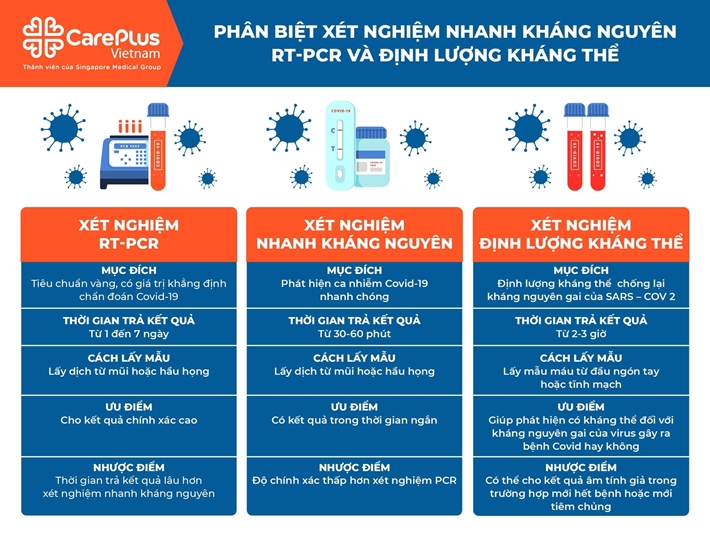RT-PCR Test, Rapid Test and Antibody Test For Covid-19

11/18/2021 3:26:18 PM
Currently, RT-PCR tests, rapid tests for SARS-CoV-2 virus antigens and quantitative antibody tests are common tests in the fight against the COVID-19 epidemic. So what is the difference and what are the uses of these types of tests? To answer these questions, please read along to distinguish the above tests.
1. Antigen Rapid Test
Rapid antigen test is a test that helps detect virus-specific protein (also known as antigen) COVID-19 present in respiratory tract samples taken from the nose or pharynx of an infected person.
Advantages
- Time to return results quickly from 15 to 30 minutes.
- Low cost.
- The test technique is simple and easy to perform.
- Suitable for zoning and screening suspected cases on a large scale.
Defect
- The sensitivity is poor, so the rate of false positives - negatives is relatively high, so it is easy to miss infections and cause silent epidemics in the community.
- With positive results of this method, it needs to be confirmed by Realtime PCR.
- The humidity and temperature of the test site can affect the results.
2. Real-time RT-PCR test
RT-PCR is currently the gold standard for diagnosing whether someone currently infects a person with SARS-CoV-2. This test can detect virus fragments even when the body is not infected.
Advantages of RT-PCR Test
- High accuracy with RT-PCR sensitivity of 99% and specificity of 100%
- RT-PCR is less likely to yield false negatives than other testing methods
- Provide quantitative results of virus concentration at the time of testing. Therefore, it is qualified support for doctors in predicting disease progression as well as evaluating treatment effectiveness.
Disadvantages
- The time to return results since sampling is longer than with the Rapid Test method. Usually, lasts for about 1 to 7 days.
- High technical requirements of samplers, testing technicians, and modern equipment and machinery.
- High price.
3. Quantitative test for Covid-19 antibodies
The quantitative COVID-19 antibody test is a method based on the determination of circulating antibodies to the SARS-CoV-2 virus in the blood. I have not exposed if a person to the virus, the body does not produce antibodies, the test result will be “NEGATIVE”. The body has already produced antibodies, and the test results will reflect an indicator (e.g. 100 U/mL). This quantitative index is high or low, showing that the body has more or less protective antibodies.
Limitations of Quantitative Covid-19 Antibody Test
False-negative results can occur when:
- If the antibody test is too soon after exposure to the virus or vaccination and your body has not yet made enough antibodies for the test to detect.
- In some individuals, such as those with weakened immune systems because of medical conditions or certain medications, the body will not develop detectable levels of antibodies, even if the person has been exposed to the virus or been vaccinated.
False-positive results are also possible:
- This can happen if the test detects antibodies from other viruses it has exposed you, such as the virus that causes the common cold.
3. Who should have the SARS-CoV-2 diagnostic and the Covid-19 Antibody test?
Who should get a diagnostic test for SARS-CoV-2
- People suspected of being infected with SARS-CoV-2 virus (with signs and symptoms) include fever, cough, difficulty breathing, sore throat, pneumonia, loss of smell.
- Persons who have been in direct contact with Covid-19 (F1) patients.
- People are entering from countries with Covid-19 epidemics.
- Covid-19 patient during treatment.
- Other causes cannot explain severe pneumonia.
- People who regularly take part in activities with a high risk of Covid-19 infection, such as sales staff and people working in crowded and airtight environments.
- People who need a negative confirmation within 72 hours to take flights from Ho Chi Minh City
-----
To help people be more proactive in protecting the health of themselves and their families to be ready to start a “new normal life” with COVID-19, CarePlus deploys Covid-19 Medical services, including: :
1. Antigen Rapid Test Service: VND 250,000
2. Realtime RT-PCR Testing Service
- At the clinic: 1,245,000 VND
- At home: 1,600,000 VND
👉 To post Covid-19 Medical services, Inbox fan page or Visit LINK